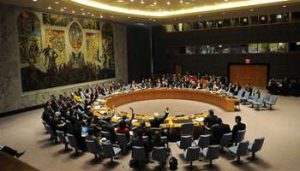 The Security Council has unanimously extended the mandate of the United Nations Mission for the Sahara MINURSO by six months, while expressing its full support for the decision of the Secretary General and his Personal Envoy, Horst Köhler, to initiate a new negotiation process before the end of this year.
The Security Council has unanimously extended the mandate of the United Nations Mission for the Sahara MINURSO by six months, while expressing its full support for the decision of the Secretary General and his Personal Envoy, Horst Köhler, to initiate a new negotiation process before the end of this year.
Köhler has invited the foreign ministers of Morocco, Algeria and Mauritania and a representative of the Polisario Front to a round-table meeting in Geneva, on December 5 and 6, the first such direct engagement since 2012.
In resolution 2440, adopted on Wednesday by a large majority of its members, the Security Council hailed Kohler’s decision to hold this initial round-table meeting, without preconditions and in good faith, in order to make an assessment of the latest developments, examine regional issues, and discuss the next steps in the political process relating to the Sahara issue.
The resolution said, for the first time ever, that Algeria is a main party to the process seeking to find a realistic, practical and durable political solution to the Sahara issue.
In its second paragraph, the resolution urged Algeria to take part in the Geneva round-table talks and to work constructively with the personal envoy (of the UN Secretary General for the Sahara) in a spirit of compromise during the whole process to ensure its success.
The resolution called on the parties to show political will and work in an atmosphere conducive to dialogue with a view to making headway in negotiations, thus ensuring the implementation of UNSC resolutions since 2007 and the success of talks.
The resolution also reaffirmed, again, the pre-eminence of the Moroccan autonomy initiative to solve the artificial conflict over the Moroccan Sahara.
The resolution on the other hand swept aside the false allegations concerning the existence of so-called “liberated territory”, maintained by Algeria and the separatist movement.
Actually, the Resolution slams the Polisario’s destabilizing actions in the region and urges the separatists to adhere fully to its commitments to the Personal Envoy not to return to Bir Lahlou, Tifariti and the buffer strip at Guerguerat and not to transfer any civilian or military structure east of the defense berm. This paragraph clearly shows that there are no liberated territory by the Polisario.
Morocco’s envoy to UN, Omar Hilale, said in a press briefing in New York following the vote, that Resolution 2440 “consecrates, for the first time, Algeria as the main party in the political process”.
“The adoption of this resolution after resolution 2414 of last April, constitutes a major development in the management of the Moroccan Sahara issue by the Security Council”, he pointed out.
He insisted that the peacekeeping mission’s mandate and the peace process needed to be de-linked.
“The political process is something, the MINURSO mandate is something else, he said, explaining that the mission’s mandate deals with supervising and monitoring the ceasefire, helping in confidence building measures, and de-mining. “The political process doesn’t depend on MINURSO, doesn’t depend on what’s going on on the field. It depends on the political will of all the parties,” he said, insisting that what is most important is to give a chance to the personal envoy to work quietly, in serenity and to give him time.”
Resolution 2440 welcomed the initiatives taken by Morocco and the role played by the National Council on Human Rights Commissions operating in Dakhla and Laayoune as well as Morocco’s interaction with Special Procedures of the United Nations Human Rights Council.
It also reiterated the Security Council’s request for consideration of a refugee registration in the Tindouf refugee camps and emphasizing efforts be made in this regard.
